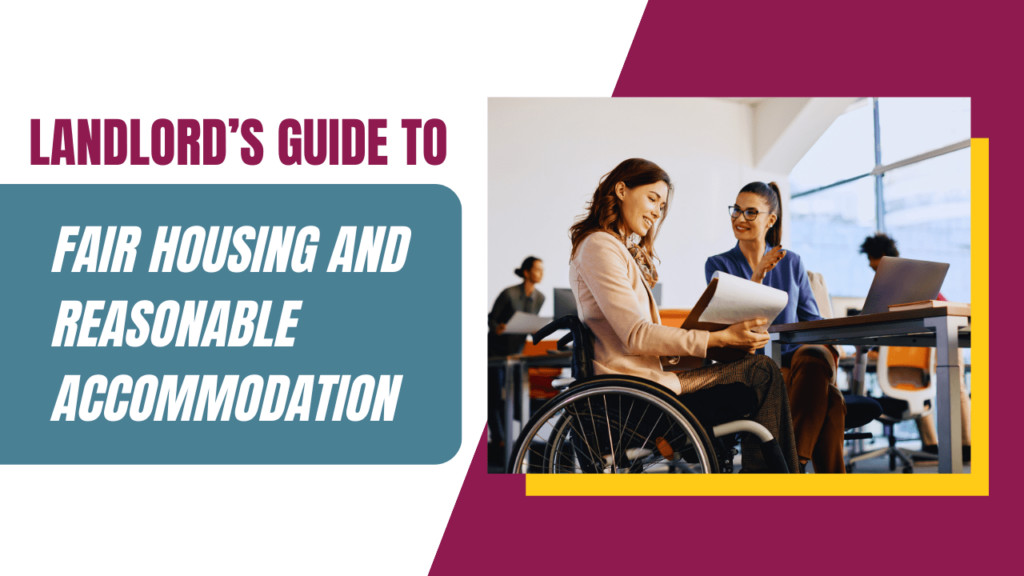
Fair housing laws require that you provide reasonable accommodations to your tenants and applicants who have a disability. The Americans with Disability Act (ADA) says that it is unlawful for a landlord to refuse “to make reasonable accommodations in rules, policies, practices, or services, when such accommodations may be necessary to afford … person(s) [with disabilities] equal opportunity to use and enjoy a dwelling.”
This is necessary to help people with disabilities move into and enjoy a rental home in Las Vegas. But, how far does the law require you to go? How can you be sure you are complying with all fair housing requirements when you’re making accommodations?
We’re taking a look at some of the things you need to consider when complying with the fair housing laws, especially if you need to make accommodations. This information is provided from our own expertise as Las Vegas property managers. If you have a broader question about the law, we recommend you speak with an attorney.
Here’s what we can tell you.
Understanding the Fair Housing Act
The Fair Housing Act is a federal law that protects people with disabilities. It’s specific to housing.
The Fair Housing Act prohibits discrimination in housing and housing-related transactions because of a person’s disability. Landlords, rental property owners, property managers, real estate agents, leasing agents, mortgage lenders, insurance agents, and anyone who has an interest in providing housing, will be bound by this federal law.
There are also state laws that apply fair housing principles. The Nevada Equal Rights Commission enforces local anti-discrimination laws, and the list of protected classes in the state of Nevada goes further than federal laws. In Las Vegas, you cannot discriminate based on race, religious creed, color, national origin, disability, sexual orientation, gender identity or expression, ancestry, familial status or sex.
Fair Housing and Rental Property Advertising
You cannot discriminate against specific tenants or classes of people when you’re marketing your rental home.
These mistakes are easy to make without even realizing it. A simple question or an off-hand remark could make a tenant feel like you would not be treating them fairly in the application process or during the tenancy. For example, you don’t want to say that your rental property wouldn’t be great for kids. That might be due to the fact that there’s a lot of traffic on the road outside or a retention pond beyond the backyard. You are thinking safety but that prospective tenant might be feeling discriminated against.
Make sure all of your listings, marketing materials, and signs comply with fair housing laws.
When you’re marketing your rental home, here are the details you can lawfully talk about why the property might appeal to everybody. Talk about how large the home is. Be specific about the number of bedrooms and bathrooms. List the square footage. Highlight den space or the size of the living room. You can include the rental amount and how much of a security deposit you will want to collect.
Your marketing should include when the home will be ready for occupancy. You should state whether pets are allowed or considered. Write and photograph all the best features of the home, whether that’s the attached garage, the garden tub in the owner’s suite, or the updated kitchen.
Try not to use language that indicates you are looking for a particular type of tenant. You cannot say anything that references any of those protected classes that we’ve been discussing.
- Do not say that your property is close to churches or mosques or synagogues.
- Do not say it’s perfect for families.
- Don’t call it a bachelor pad.
This is the type of language that can get you in legal hot water because it may be seen as discriminatory against several of the law’s protected classes.
Keep your rental property marketing accessible to everyone who is qualified to rent your home. You’re not allowed to prefer tenants of a specific gender, age range, or background.
Las Vegas Tenant Screening and Fair Housing Compliance
Screening tenants must be objective and consistent. It’s easy to make a fair housing mistake with your screening process, and you don’t want to put yourself at risk for those large fines and penalties. A couple of things can help you keep your screening process free from potential fair housing mishaps:
- Standard Qualifying Criteria. One important tool that will protect you during your screening process is a set of standard rental criteria or qualifications. Put these criteria in writing and provide it to any tenant who is interested in filling out an application. Then, make sure you follow your own standards consistently every time you screen a potential tenant.
- Automation. When you use technology and resources to automate and modernize your screening process, you’ll be able to protect yourself from potential fair housing missteps. A landlord who sits down and manually looks into the background of each applicant will likely fall back on assumptions and prejudices that they don’t even realize they have.
- Third-Party Screening. Consider having an experienced professional screen your tenants. When you’re using technology, software, and a third-party screening company, you’re not in danger of letting your personal opinions and preferences creep in. Everything is consistent and automated.
Screen every application against the same standards and requirements. Denying one applicant because of a 550 credit score is not going to hold up in court if the tenant you eventually place has a 525 credit score. Be consistent and document the entire process.
Set up the standards you seek in terms of credit, income, criminal history, and rental references. This will make it easy for you to move through the application process because you’ll know exactly who is approved and who is not just by looking at the data. It’s objective and protects you against any potential claims of discrimination.
Accommodations: Service Animals and Support Animals
Plenty of answers can be found when you’re looking for specifics around how to make your property ADA compliant. You can get some measurements for grab bars and you’ll find vendors who have installed ramps that lead to a front door.
The subject of service animals and support animals can be a bit more confusing.
Animals can be accommodations for people who have disabilities.
While pets are optional, service and support animals are not. This is an important distinction, and one that has serious legal consequences. You can allow pets or disallow pets. If you do allow pets, you can charge a pet fee or a pet deposit.
This is not permitted with service animals and support animals.
The service animal your tenant needs is seen as an accommodation, not as a pet. Therefore, not only do you have to allow it; you also cannot charge a pet deposit, pet fee, or pet rent.
- Identifying Service Animals vs. Companion Animals
When your Las Vegas tenant needs a service animal for a physical or intellectual disability, it’s usually obvious, and you cannot ask what the service animal is for. Typically, a person who is blind will not have to explain their need for a Seeing Eye Dog. Service animals are certified and trained. A service animal is always a dog.
While it may be uncomfortable and is not always recommended, you can ask for documentation if the disability is not immediately apparent and your tenant is requesting an emotional support animal or a companion animal. Companion animals are different from service animals in that they can be any type of animal and they aren’t trained to do a specific task or serve a specific purpose. They offer comfort and support.
In these cases, you can ask your tenant for documentation from a reliable source explaining the disability and why the animal is required. If you’re not working with a Las Vegas property management company, be careful here. Asking for documentation is permitted, but being difficult or expressing doubt can get you into legal trouble.
Do your due diligence, but don’t set yourself up for a discrimination claim.
- Defining Disabilities
Who has a disability for the purpose of service and support animals? Look to the federal nondiscrimination laws for help here. They define a person with a disability to include any individual with a physical or mental impairment that substantially limits one or more major life activities; an individual with a record of such an impairment; or, an individual who is regarded as having such an impairment.
In general, a physical or mental impairment includes, but is not limited to, conditions such as:
- Orthopedic disabilities
- Visual disabilities
- Speech and hearing impairments
- Cerebral palsy
- Autism spectrum disorders
- Epilepsy
- Muscular dystrophy
- Multiple sclerosis
- Cancer
- Heart disease
- Diabetes
- Human Immunodeficiency Virus (HIV)
- Developmental disabilities
- Mental illness
- Drug addiction and alcoholism
It’s easy to make a mistake with fair housing and anti-discrimination laws. You might have the best intentions and still find yourself discriminating in your marketing, screening, or leasing practices. Treating a tenant with a disability differently than you treat your other tenants can lead to lawsuits and claims. Violating a fair housing law can cost you $16,000 just for your first offense. This is not a mistake you want to make. You’ll suffer financially and your reputation will take a hit, too.
 We’re here to help you comply. Please contact us at New West Property Management. Our team expertly manages residential rental homes in Las Vegas and throughout Clark County, including Henderson and North Las Vegas.
We’re here to help you comply. Please contact us at New West Property Management. Our team expertly manages residential rental homes in Las Vegas and throughout Clark County, including Henderson and North Las Vegas.
